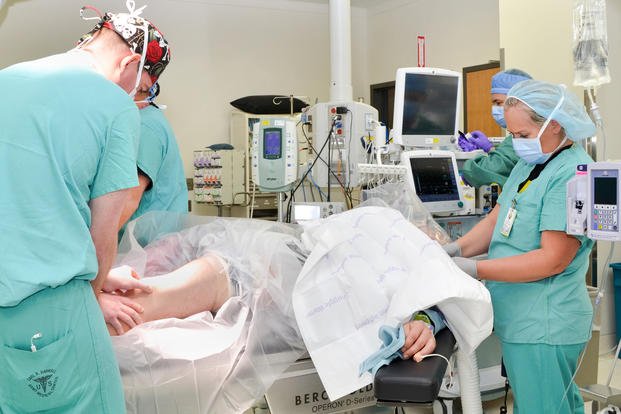Though Defense Secretary Mark Esper noted that military medical and dental treatment facilities currently have adequate personal protective equipment, they will be phasing out "elective surgeries" to free up staff and supplies for the overstressed private sector, he said in a town hall Tuesday.
"We will soon be coming out with a policy on elective surgery that will limit elective surgeries so that we can both free up doctors and nurses and other medical professionals," Esper said. "But at the same time, it will increase supply by reducing the demand on personal protective equipment."
The Centers for Medicare & Medicaid, U.S. Surgeon General Dr. Jerome Adams and the American College of Surgeons have already called for the discontinuation of elective surgeries, including treating carpal tunnel syndrome, performing colonoscopies and, if possible, treating low-risk cancer.
Related: How VA and Tricare Users Can Get Tested for Coronavirus
Esper said the Military Health System, or MHS, currently has enough equipment, such as masks, gowns and ventilators, that it's been able to share them with an interagency team fighting the novel coronavirus pandemic. But the MHS will adjust its policies until the private sector can ramp up its production of the items, he added.
Esper previously announced that the DoD was preparing to give 5 million respiratory masks and 2,000 ventilators from its Strategic National Stockpile to states struggling to treat coronavirus patients. The stockpile maintains medical supplies and medications for just such a national emergency.
"Like everybody else, we're going to face shortages with regard to some of the PPE until the private-sector industry can pick up the slack," he said, adding the system will "get back to normal" once production is up.
"But in the meantime, I am confident we have enough," Esper said. "We want to ensure that we're able to share to help our fellow Americans and then, over time, we'll continue to manage our medical capabilities."
-- Dorothy Mills-Gregg can be reached at dorothy.mills-gregg@military.com. Follow her on Twitter at @DMillsGregg.













